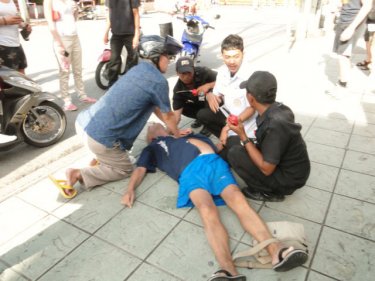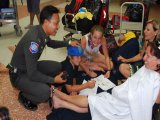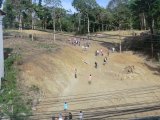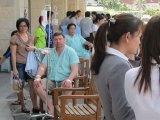As thousands of residents and tourists fled the holiday destinations along the west coast of Phuket, Sert sped towards the danger.
What he found was an evacuation exodus in progress.
There was no great chaos. But there was no sense of order, either. Word of mouth spread the news.
Tourists in Jungceylon shopping mall learned the important information from each other. There was a rush for the exit, just as tourists all along Phuket's coast were soon rushing for the exit.
The big plus for Phuket and the entire Andaman tsunami coast was the two-hour gap between the earthquake and the expected arrival of a potential tsunami.
Given time on a bright, sunny afternoon, even the slowest can be saved. As evacuations go, was it fast enough?
Well, yes and no. Roads quickly jammed, almost as fast as telephones.
Wal Brown, an International Liason Volunteer at Kathu Police Station, said the police did an efficient job in fanning out through Patong, telling people to evacuate.
''It went smoothly,'' he said. ''Their problem was that the roads were quickly choked.''
People drove out of Patong in their cars, then parked as close as possible to Patong once they reached higher ground. There was no sense of the need to keep roads open for hundreds of others who followed.
News updates were non-existent as mobile telephone services overloaded, then could not be used.
On a hilltop near Patong, a reader reported to Phuketwan ''Everyone was waiting for news info from local authorities. We never did hear.
''I met a couple with three small kids. They were staying at the Merlin Beach, behind Tri Trang beach.
''They had walked uphill because staff panicked without giving any explanation to them.
''Staff left or went for safety to the rooftop. These people got no help and were not able to climb up to the roof.
''They went outside to get a tuk-tuk from the normally oversupplied amount of tuk-tuks in front of the hotel. But the tuk-tuk drivers had already all fled to safety.''
Where some saw chaos and lack of information, others saw commonsense and coordination. At Laguna Phuket, guests evacuated to Cherng Talay without problems.
Only one casualty was reported - a man who collapsed, possibly from the excitement of it all, in a Patong street. By the time 5.40pm came, only journalists and emergency workers were on the shorefront at Patong.
A lone walker strode past close to the waves, oblivious to the fact that the beach had been cleared. There will always be a lone walker.
The tsunami towers? Some sounded, others did not. Because of the two-hour gap between the earthquake and the ''wave,'' there was no need for them.
The evacuation was being repeated with different degrees of efficiency all around the Andaman.
At Nam Khem, a fishing village in Phang Nga where 800 people died among the total number of 5400 tourists and residents who perished in the 2004 tsunami in Thailand, everything went smoothy.
Practice makes perfect. Village leader Sathian Peachjiang said the people of Nam Khem follow tsunami warnings closely. They are always quickly aware whenever there's a danger.
They don't listen to local or national authorities. They tune to the National Disaster Warning Centre in Bangkok and the Asia Pacific Tsunami Warning centre in Hawaii.
''We had a horrible time in 2004,'' Khun Sathian said. ''When whole families are wiped out among your neighbors, you are constantly on your guard to make sure it doesn't happen again.
''We are on-guard 24 hours a day. The Department of Disaster Prevention and Mitigation team in Phang Nga joins with us to make sure we always know if there's any danger.''
The tsunami will never be forgotten in Nam Khem by this generation or the next generation. But Khun Sathian said he feared other parts of Thailand that suffered less were less concerned.
''People who had direct experience of the 2004 tsunami at an official level have been moved on since,'' he said. ''So the memory of the devastation of the tsunami grows dimmer.
''The secret,'' he said, ''is to never forget. Not for a day, not for a single hour. The key to survival is eternal vigilance.''
Phuket, with its live-for-today approach to tourism and the future, really could do a lot more to make visitors feel more secure, whether or not a big wave comes next time.
The hope is that yesterday's lessons will be learned and taken to heart.
















I am just so happy no tsunami this time. The old one still stucks deep.
Posted by Lena on April 12, 2012 13:07